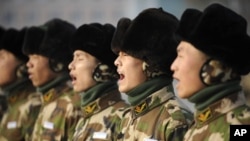China’s fast growing military might have made some of its neighbors uneasy about the security outlook in East Asia. Recently, Japan made significant changes to its defense posture with an eye on China.
U.S. Defense Secretary Robert Gates earlier this month stressed the importance of the U.S.-Japanese alliance in Asia’s security. Gates lauded Japan’s decision in December to shift military resources from the north near Russia to southwestern islands closer to China.
And he asserted that without the six-decade-old U.S.-Japan security alliance China “might behave more assertively toward its neighbors.”
China’s fast growing military capability has ruffled some of its neighbors, particularly those with territorial disputes with China, such as Japan and several Southeast Asia nations.
Last week, China tested its first stealth jet fighter. Some Western defense analysts say China is also preparing to deploy a new missile that could strike at U.S. aircraft carriers far beyond Chinese territory.
Tsuneo Akaha is the director of the Center for East Asia Studies at the Monterey Institute of International Studies in California. He says the change in Japan’s defense outlook addresses such concerns.
"The most important reason is the expanding Chinese military, particularly naval capabilities offshore and also the recent development of new aircraft, stealth fighters, and the Chinese deployment and plans to build more submarines that would allow the Chinese to project their power to greater distances," Akaha said.
Tensions between Tokyo and Beijing rose in September when a Chinese trawler collided with a Japanese patrol boat near the disputed Senkaku or Diaoyu islands.
Though not a direct party to any of China’s territorial disputes in the Pacific, the United States is very much involved in shaping an emerging security order in Asia.
The U.S. says it has a national interest in freedom of navigation in these waters. Akaha says the U.S. has rallied allies and smaller nations in Southeast Asia to help temper Chinese assertiveness.
"This sort of gives greater political incentive and also strategic rationale for engaging Southeast Asian countries on the part of the United States,” Akaha says, “and that would also shore up Japanese confidence that as long as the U.S. is present there, international shipping will be secured."
Ma Zhengang, chairman of the China Arms Control and Disarmament Agency, says China does not want conflict with the United States.
But he says if the U.S. keeps pointing at China as its rival, even challenges Chinese interests of harmony, then it is possible that there could be severe crisis between the two countries. This is something that China does not want to see. He says that cooperation in matters of security between China and the U.S. benefits both countries. He adds that he absolutely does not think that it is inevitable for the two countries to get into a confrontation.
Secretary of Defense Gates also said last week China is not an inevitable strategic adversary of the United States. Still, some Asian nations are recalibrating their defense capabilities for future threats and are watching U.S.-China relations closely.
China claims the South China Sea, including the Spratly and Paracel islands. But Brunei, Malaysia, the Philippines, Taiwan and Vietnam also have claims on the islands.
Asia Recalibrates Defense to China's Fast Growing Military




